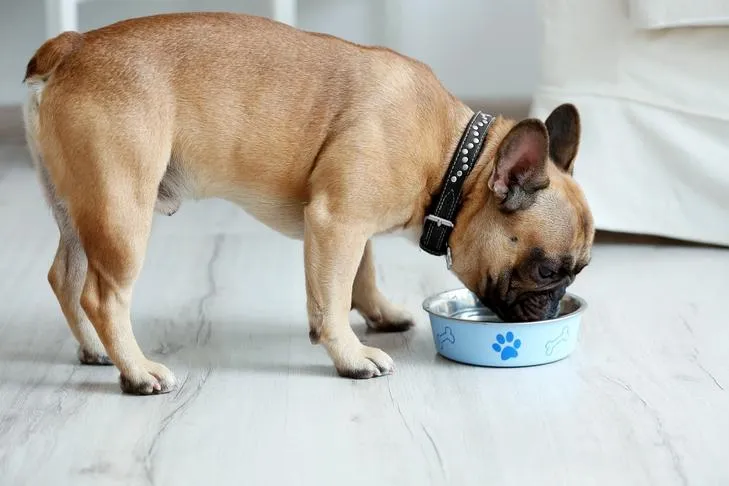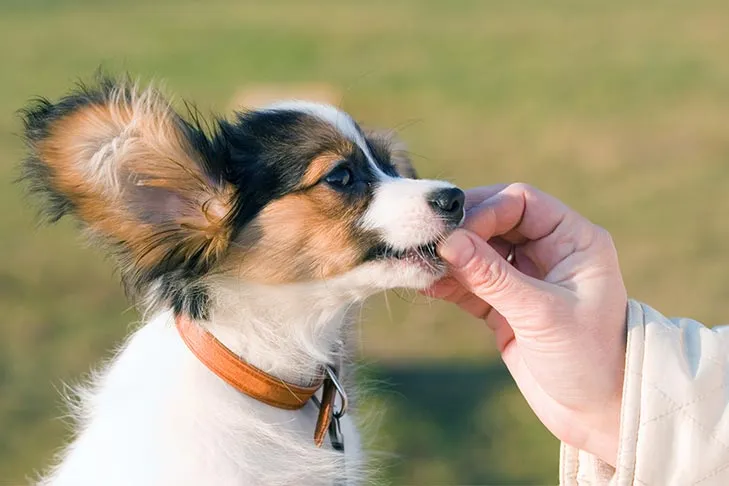As loving pet parents, it’s natural to wonder if you can share a bite of your meal with your furry companion. The good news is, many common human foods can be safe and even beneficial for dogs when given in moderation and prepared correctly. Understanding What Is Safe To Feed Dogs from your kitchen is crucial for their health and well-being. This guide delves into a variety of human foods that dogs can safely enjoy, offering insights into their nutritional benefits and important precautions. Before introducing any new food into your dog’s diet, especially if they have sensitivities or a history of illness, it’s always best to consult with your veterinarian to ensure it’s appropriate for their specific needs. If your dog isn’t eating or showing signs of illness, it’s particularly important to seek professional advice. Sometimes, even safe foods can cause an upset stomach if introduced too quickly or in large quantities.
General Guidelines for Feeding Human Foods to Dogs
While many human foods are safe, preparation is key. Always ensure foods are:
- Plain and Unseasoned: Avoid salt, sugar, spices, onions, garlic, and other common seasonings which can be toxic or harmful to dogs.
- Cooked Appropriately: Raw meats, eggs, and some fish can carry bacteria or parasites. Always cook these thoroughly.
- Bite-Sized and Boneless: Cut food into small, manageable pieces to prevent choking. Remove all bones, seeds, pits, and tough skins.
- Moderation is Essential: Human foods should only be given as occasional treats, making up no more than 10% of your dog’s daily caloric intake. Their primary diet should come from high-quality commercial dog food.
- Observe Your Dog: After introducing a new food, monitor your dog for any signs of digestive upset, allergies, or unusual behavior.
A-Z Guide to Human Foods Your Dog Can Enjoy
Navigating the world of human foods for your canine companion can be confusing. To help you confidently identify what is safe to feed dogs, we’ve compiled a comprehensive list of common foods, detailing their benefits and crucial preparation tips. Remember, even safe foods can become problematic if not served correctly or in appropriate portions.
Bread
Small quantities of plain, unseasoned bread are generally safe for dogs. It’s important that the bread contains no spices, artificial sweeteners, or dangerous ingredients like raisins. While it won’t offer significant health benefits, plain bread can be a mild treat. However, it’s high in carbohydrates and calories, so it should be given sparingly to prevent weight gain. Homemade breads without preservatives are a better option than most store-bought varieties, but overall, it provides little nutritional value.
Cashews
Cashews can be a delightful treat for your dog in very small amounts. They contain beneficial nutrients such as calcium, magnesium, antioxidants, and protein. However, despite having less fat than some other nuts, feeding too many cashews can contribute to weight gain and potentially pancreatitis due to their fat content. Always offer unsalted cashews as excessive sodium is harmful to dogs. A few cashews occasionally can be a nice, healthy reward.
Cheese
Cheese, in small to moderate quantities, can be a tempting and safe treat for most dogs. It’s a good source of protein and calcium. While lactose intolerance is less common in dogs than in humans, some dogs might experience mild digestive upset. If your dog doesn’t show signs of sensitivity, lower-fat varieties like cottage cheese or mozzarella are preferable to high-fat options. Many dogs also enjoy specialized dried cheese chews designed specifically for them, like Himalayan dog chews, which are a safe and long-lasting alternative.
 Dog looking at a slice of cheese on a kitchen table, considering a safe treat.
Dog looking at a slice of cheese on a kitchen table, considering a safe treat.
Coconut
This tropical fruit offers unique health benefits for dogs. Coconut contains lauric acid, which possesses antibacterial and antiviral properties, potentially aiding in combating infections. It can also contribute to fresher breath and may help alleviate skin conditions such as hot spots, flea allergies, and general itchy skin when used topically or internally. Both coconut milk and coconut oil are safe for dogs. However, always ensure to remove the fibrous outer husk of the coconut, as it can be a choking hazard or cause intestinal obstruction if ingested.
Corn
Corn is a common ingredient in many commercial dog foods, recognized for providing carbohydrates, fiber, and some essential nutrients. It’s safe for dogs to eat, but a critical precaution is to always remove it from the cob. The cob itself is indigestible and can cause severe intestinal blockages, which often require emergency veterinary surgery. If sharing corn, ensure it is plain, cooked, and completely off the cob. For a fun, safe alternative, consider a squeaky corn-shaped toy!
Eggs
Cooked eggs are an excellent source of protein, vitamins (like B12 and riboflavin), and minerals, making them a nutritious addition to your dog’s diet. They can also be particularly soothing for an upset stomach. It is vital that eggs are fully cooked – scrambled, boiled, or poached – as raw egg whites contain avidin, an enzyme that can interfere with biotin absorption, potentially leading to a biotin deficiency over time. Always cook eggs thoroughly and cool them before offering to your pet.
Fish
Fish offers a wealth of benefits for dogs, being rich in beneficial fats and amino acids that support overall health. Salmon and sardines are particularly noteworthy. Salmon is packed with omega-3 fatty acids, which are fantastic for joint health, skin and coat condition, and brain function, in addition to being a great source of protein. Sardines are beneficial for their soft, digestible bones, providing an extra boost of calcium. When preparing fish (with the exception of sardines), meticulously remove all tiny bones, as they can splinter and cause internal injury. Never feed your dog uncooked or undercooked fish due to the risk of parasites. Fully cooked and cooled fish can be a healthy addition, but limit intake to no more than twice a week to avoid mercury accumulation.
Ham
While a small piece of ham can be given as an occasional treat, it’s far from the healthiest option for dogs. Ham is typically very high in sodium and fat, both of which can be detrimental to a dog’s health in large quantities. High sodium intake can lead to increased thirst, urination, and in severe cases, sodium ion poisoning. High fat content can cause digestive upset or contribute to pancreatitis, especially in susceptible breeds. So, while sharing a tiny, plain piece won’t usually hurt, it should not become a regular habit.
 French Bulldog enjoying a small, safe portion of human food from its bowl.
French Bulldog enjoying a small, safe portion of human food from its bowl.
Honey
Honey is a natural powerhouse of nutrients, including vitamin A, potassium, calcium, magnesium, copper, and a range of antioxidants. Small amounts of local honey can potentially help dogs with seasonal allergies by introducing trace amounts of local pollen, which may build up immunity over time. Beyond consumption, the sticky properties of honey can also make it a useful topical treatment for minor burns and superficial cuts due to its natural antiseptic qualities. Always offer raw, unprocessed honey in very small quantities.
Milk
While the image of a puppy lapping up milk is classic, adult dogs can be more sensitive. Dogs can have milk, but it’s important to proceed with caution. Many adult dogs are lactose-intolerant to varying degrees, meaning they lack the enzyme needed to properly digest lactose. Consuming milk can lead to digestive issues such as diarrhea, vomiting, and gas. If you choose to offer a small amount of milk, monitor your dog closely for any adverse reactions. For most dogs, water remains the best and safest source of hydration.
Peanut Butter
Peanut butter is an extremely popular and generally safe treat for dogs, offering an excellent source of protein, heart-healthy fats, and essential vitamins like B and E, as well as niacin. The healthiest option is raw, unsalted peanut butter. However, it is absolutely critical to read the label carefully and ensure the peanut butter does not contain xylitol. Xylitol is a sugar substitute commonly found in many sugar-free products and is highly toxic to dogs, capable of causing a rapid and severe drop in blood sugar, liver failure, and even death. Always double-check ingredients before sharing this beloved snack.
Peanuts
Unlike almonds, which are not recommended for dogs, plain peanuts are safe for dogs to eat. They are packed with beneficial fats and proteins that can contribute to your dog’s overall health. Similar to cashews, moderation is key due to their fat content, as too much fat can lead to issues such as pancreatitis. It’s also crucial to avoid salted peanuts, as excessive salt is difficult for a dog’s kidneys to process and can lead to sodium ion poisoning. Offer unsalted, shelled peanuts in small amounts as a treat.
Popcorn
Air-popped popcorn, when unsalted and unbuttered, can be a safe and enjoyable snack for your dog in moderation. It contains beneficial nutrients such as riboflavin and thiamine, which support eye health and digestion, along with small amounts of iron and protein. The key is preparation: ensure all kernels are fully popped, as unpopped kernels can pose a choking hazard or become lodged in teeth. Avoid microwave popcorn, which often contains artificial flavors, excessive salt, and chemicals that are harmful to dogs.
Pork
Pork, when properly prepared, is a highly digestible protein source packed with amino acids that are vital for muscle health and bodily functions. It typically contains more calories per pound than some other meats, so portion control is important. For some pets with sensitivities to more common proteins like chicken or beef, pork can be a less allergenic alternative. Always ensure pork is fully cooked to eliminate parasites and bacteria, and serve it plain, without any added seasonings, onions, or garlic, which are toxic to dogs.
 Healthy Samoyed puppy resting outdoors, symbolizing good nutrition and pet well-being.
Healthy Samoyed puppy resting outdoors, symbolizing good nutrition and pet well-being.
Quinoa
Quinoa, a pseudocereal, has gained popularity in human diets and is now increasingly found in high-quality dry dog foods. Its robust nutritional profile, including complete protein, fiber, and various minerals, makes it a healthy and beneficial alternative to traditional starches like corn, wheat, and soy often used in kibble. When preparing quinoa for your dog, ensure it is cooked thoroughly and served plain, without any added spices or sauces. It can be a great addition to their diet for an extra nutritional boost.
Salmon
As previously mentioned, fully cooked salmon is an outstanding source of protein, good fats (especially omega-3 fatty acids), and amino acids. These nutrients are crucial for promoting joint and brain health, and giving a dog’s immune system a significant boost. However, raw or undercooked salmon poses a severe risk to dogs because it can contain parasites that cause Salmon Poisoning Disease, a potentially fatal condition. Symptoms can include vomiting, diarrhea, dehydration, and lethargy. It is absolutely essential to cook salmon all the way through to kill these dangerous parasites before offering it to your dog.
Shrimp
A few shrimp given occasionally can be a healthy treat for your dog. They are notably low in fat, calories, and carbohydrates, while being rich in antioxidants, vitamin B-12, and phosphorus. The most important preparation steps are to ensure shrimp are fully cooked and that the entire shell, including the tail, head, and legs, is completely removed. Raw shrimp can contain harmful pathogens, and the shell can be a choking hazard or cause digestive issues.
Tuna
Dogs can consume tuna, but only in very small, controlled amounts. Cooked, fresh tuna is an excellent source of omega-3 fatty acids, which support heart and eye health. When considering canned tuna, opt for varieties packed in water (not oil) and without added spices. Canned tuna generally contains small amounts of mercury and sodium, which should be avoided in excess. An occasional, tiny bit of plain canned tuna or tuna juice can be a treat, but regular or large servings are not recommended due to potential mercury accumulation.
Turkey
Plain, cooked turkey is generally safe for dogs and can be a good source of lean protein. However, careful preparation is key. Always remove any excess fat and skin from the meat before offering it, as these can be difficult to digest and contribute to pancreatitis. Crucially, check thoroughly for bones; poultry bones are brittle and can splinter during digestion, leading to choking, internal blockages, or even tears in the intestines. Furthermore, avoid giving your dog any turkey that has been seasoned with excessive salt, onions, garlic, or other spices, as these ingredients are toxic to canines.
Wheat or Grains
Contrary to popular belief, most dogs do not need to be on a grain-free diet, and grains can be a valuable part of their nutrition. Grains like wheat, corn, and oats are excellent sources of protein, essential fatty acids, and dietary fiber, which aids in digestion. If your dog has specific allergies or sensitivities, your veterinarian might recommend avoiding certain grains, but this is specific to individual dogs. For the vast majority, incorporating wholesome grains into their diet is perfectly healthy. Always consult your veterinarian for personalized dietary recommendations, especially if your dog isn’t eating or seems to have dietary issues.
Yogurt
Plain yogurt can be a perfectly acceptable and even beneficial snack for dogs. The active bacterial cultures (probiotics) found in plain yogurt can help strengthen and support a healthy digestive system. However, like milk, some dogs may have trouble digesting dairy products due to varying degrees of lactose intolerance. If your dog tolerates it well, plain, unsweetened yogurt is the best choice. Absolutely avoid any yogurts with added sugars, artificial sweeteners (especially xylitol), or fruit flavorings, as these can be harmful or toxic.
 Papillon puppy carefully accepting a small, safe human treat from its owner's hand.
Papillon puppy carefully accepting a small, safe human treat from its owner's hand.
What Human Foods Are NOT Safe for Dogs?
While our focus has been on what is safe to feed dogs, it is equally, if not more, critical to be aware of the human foods that are dangerous and potentially toxic to them. Some common household foods can cause severe illness, organ damage, or even death if ingested by dogs. Always keep foods like chocolate, grapes, raisins, onions, garlic, avocado, macadamia nuts, xylitol (found in many sugar-free products), and alcohol completely out of your dog’s reach. If you suspect your dog has eaten something toxic, or if you’re asking yourself what can I feed my dog when he’s sick due to ingesting something questionable, contact your veterinarian or an emergency animal hospital immediately. Prompt action can save your pet’s life.
Conclusion
Understanding what is safe to feed dogs from your own kitchen empowers you to provide healthy and enjoyable treats that complement their regular diet. From lean proteins like turkey and salmon to wholesome grains like quinoa and occasional dairy like plain yogurt, the options are varied. The golden rules remain: moderation, plain preparation, and vigilance. Always introduce new foods slowly, observe your dog’s reaction, and prioritize their primary dog food. When in doubt, a quick call to your veterinarian can offer peace of mind and ensure your furry friend stays happy and healthy. Keep this guide handy and make informed choices to enrich your dog’s diet safely. Explore more articles on Dog Care Story for expert advice on canine nutrition and health!
